Turkey is ‘weaponizing water’ in parts of Syria, say humanitarian groups.
They have repeatedly accused Turkey of ‘weaponizing water’ since its military takeover of the region in October 2019.
Those especially affected are those living in the north of Syria. The past few years’ religious freedom for Kurds, Christians and Yazidis is reportedly again under attack from mainly Turkish military and Syrian Islamist fighters.
Turkey has cut off the water supply to the northern city of Hassakeh and surrounding districts – home to over a million people – for nearly four weeks.
This is risking hundreds of thousands of lives amidst the coronavirus pandemic and soaring temperatures, says the Syrian Democratic Council.
“This is a crime against humanity,” says Gabriel Shamoun, the council’s vice president.
The present water supply problems began when Turkey and its allies shut down the Alok pumping station. This was the eighth time the water had been cut off since Turkey invaded and took over the Ras al-Ain area last October, observers say.
They aim is to choke the inhabitants of Hassakeh into submission.
The Alok pumping station provides drinking water for around 800,000 people. It is also the main source of water for tankers supplying potable water to tens of thousands of inhabitants. The pumping station became inoperable during the Turkish invasion. So far service has been only partially restored.
According to UNICEF, if people are forced to rely on unsafe water from shallow wells, children and others face increased risk of waterborne diseases. Tankers transporting potable water are expensive and beyond many people’s financial means.
Saying Turkey is using water as a “provocation” against the autonomous region, Shamoun is urging the U.S., the United Nations, and Russia (the Syrian government’s main backer) to pressure Turkey to restore Hassakeh’s water supply.
Kurds and Syriac Christians from this area have been America’s chief ally in fighting Islamic State militants in Syria and ending its territorial caliphate.
Last year’s U.S. troop pullback and Turkey’s subsequent offensive are raising fears of an Islamic State resurgence.
“Using water as a weapon — which is not the first time — is a barbaric act and a flagrant violation of fundamental human rights,” says the Damascus-based head of the Syriac Orthodox Church, Patriarch Ignatius Aphrem II of Antioch.
“Yet, there has been no response from the international community to this atrocity, despite the constant appeal of the people of the region,” he wrote in a letter to the U.N. Secretary-General Antonio Guterres on 21 August.
People in Afrin and the autonomous northeast were allowed to choose their own faith and religious beliefs until militant Islamists working with the Turkish military invaded Afrin in January 2018.
Since then, Christians, Yazidis and other religious minorities have been persecuted; their homes, businesses and properties have been taken over by the troops, and many have been forced to flee. Those who converted to Christianity face particular danger from the Islamists.
Source
- Catholic News Service
- Image: UCA News
News category: World.




